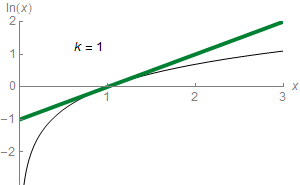I have a small problem with the Taylor series. To be exact with the natural logarithm. For what I realized, is because the divisor grows brutally and the word script does not give me more, I've tried with data types long long but even so it helps me solve the problem.
C ++ Code:
#include <bits/stdc++.h>
using namespace std;
double log_mac(double);
int main()
{
double x = 10;
cout << "Ln calculado con la funcion en <cmath>" << endl
<< "ln(10) = " << log(x) << endl;
cout << "Ln calculado con funcion propia" << endl;
cout << "ln(10) = " << log_mac(x) << endl;
}
double log_mac(double x)
{
double resp = 0;
for(int n = 1 ; n <= x ; n++)
{
double dividendo = pow(-1, n+1);
double divisor = n;
double multiplicador = pow(x, n);
double temp = (dividendo / divisor) * multiplicador;
//cout << dividendo << endl;
resp += temp;
}
return resp;
}

